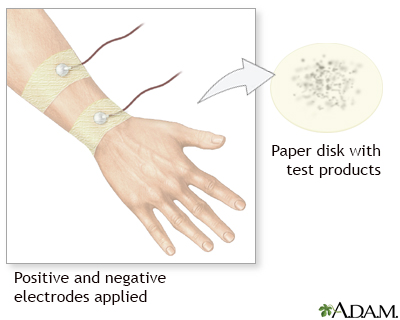Sweat Chloride Tests (SCT)

Sweat Chloride Tests (SCT)
The Sweat Chloride Tests (SCT) is the primary diagnostic tool for cystic fibrosis (CF), a genetic disorder caused by mutations in the CFTR gene that impair chloride transport. This test measures chloride concentration in sweat, reflecting CFTR protein dysfunction. Below is a detailed overview of its clinical use, methodology, and limitations.
Clinical Applications
SCT is indicated for:
- Newborn screening follow-up after positive CF screening results16.
- Symptomatic individuals with recurrent lung infections, malnutrition, or digestive issues26.
- Family history of CF or genetic carrier status confirmation26.
Procedure
- Preparation:
- Sweat Stimulation:
- Collection:
Interpretation of Results
| Chloride Level (mmol/L) | Diagnosis |
|---|---|
| <30 | CF unlikely367. |
| 30–59 | Intermediate; repeat testing and genetic analysis recommended357. |
| ≥60 | CF confirmed (requires two tests if asymptomatic)37. |
Note: Premature infants or those <2 weeks old may require delayed testing due to insufficient sweat production26.
Limitations and Considerations
- False positives: Elevated chloride levels may occur in celiac disease, Klinefelter syndrome, or polyethylene glycol (PEG) laxative use56.
- False negatives: Rare but possible in edema or inadequate sample collection67.
- Technical sensitivity: Requires specialized centers with trained personnel to avoid errors16.
Advances in SCT Utilization
- Biomarker for therapy: Sweat Chloride Tests (SCT) monitors CFTR modulator effectiveness, reflecting direct CFTR function restoration4.
- Age/gender variability: Chloride levels are slightly higher in males across all diagnostic ranges7.
Conclusion
The sweat chloride test remains the gold standard for CF diagnosis, though clinical correlation and genetic testing are essential for ambiguous cases. Advances in understanding CFTR modulation have expanded SCT’s role in evaluating treatment efficacy.
Consult with Our Expert Team!
At DrStemCellsThailand (DRSCT)‘s Anti-Aging and Regenerative Medicine Center of Thailand, we provide comprehensive diagnostic evaluations and personalized care for cystic fibrosis and related conditions. For inquiries about sweat chloride testing or CF management, contact our specialists today.
Consult with Our Team of Experts Now!
For further reading, refer to:















